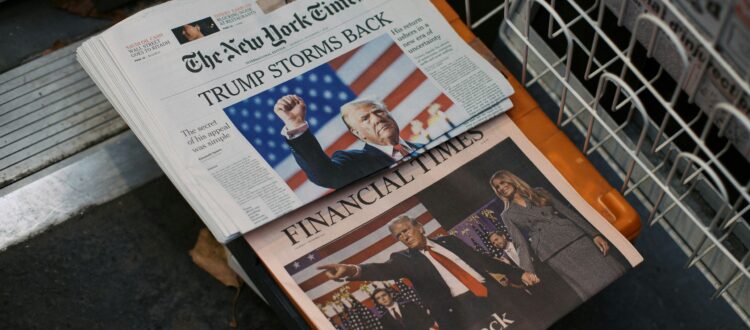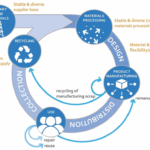Possible Implications of Trump’s Re-Election on Critical Raw Materials Dynamics
By Alessandra Hool, David Peck, and Patrick Wäger
Donald Trump’s re-election as President of the United States is likely to usher in a period fraught with new uncertainties for the critical raw materials sector. The combination of a rollback of climate initiatives, a more challenging trade environment, and a focus on national sovereignty in resource management creates a volatile landscape. Rising tensions between trading partners, potential retaliatory actions, and a slowing of the pace in the shift away from fossil fuel dependency could impact global supply chains. As the world grapples with the challenges of economic uncertainty, conflicts, and climate change, the policies Trump has proposed during his campaign are likely to exacerbate existing uncertainties. At the same time, the world needs increased sustainability, reliable markets, and deeper international cooperation in the raw materials sector.
The re-election of Donald Trump as President of the United States could significantly impact the critical raw materials sector by reshaping the energy transition, trade policies, defense strategies, international rules-based order, and international economic relations.
During his first term as President, Trump focused on expanding domestic energy production from fossil fuels by rolling back green regulations that restricted oil drilling, gas drilling, and coal mining [1]. His administration has committed to continue these policies, aiming to keep fossil-based energy prices low while fostering greater energy independence. Trump’s indication of plans to withdraw the United States from the Paris Agreement again raises concerns about the potential for increased emissions and reduced commitments to climate change mitigation. There is speculation that Trump could also attempt to withdraw the U.S. from the United Nations Framework Convention on Climate Change (UNFCCC), the foundational treaty from which the Paris Agreement was derived [2].
Trump has also announced in the past that he plans to undo the Green New Deal and rescind unspent funds under the Inflation Reduction Act, which is set to invest up to $1.2 trillion over the next decade in climate solution technologies. While completely dismantling the law might be challenging – considering much of the investment is targeting Republican districts and is creating local jobs – Trump might seek to repeal specific provisions such as tax credits for electric vehicles or introduce stricter criteria for energy tax credits, potentially affecting the domestic manufacturing surge in sectors like solar panels, EVs, and batteries, and the related raw material demand [3,4]. With the potential cuts to funding aimed at renewable energy and green technology, innovation in circular practices may also stagnate, and a reduction in support for environmentally friendly policies may lead to a failure to establish the necessary infrastructure for recycling critical materials and other circularity strategies. The new Trump presidency might also affect investor confidence in the clean energy sector. With a likely focus on fossil fuels and less regulation on traditional energy sources, investments in renewables and materials critical to clean energy technologies markets might decrease, affecting future innovation and technology development in the U.S., but also abroad.
A major aspect of Trump’s first presidency was his approach to trade, notably initiating a Sino-U.S. trade war by imposing tariffs on products from China, while banning high-tech exports. Trump cited unfair trade practices and national security as reasons for these actions. These have become a justification for implementing protectionist policies in other countries as well, and also the Biden administration largely maintained this U.S. course of action [5]. Trade restrictions on the grounds of national security leverage trade laws dating back decades, illustrating a new readiness to utilize historical legislative powers for establishing trade barriers [6].
The trade warfare between the U.S. and China has prompted significant shifts in supply chains, such as the U.S. increasingly importing cars and automotive parts from Mexico [7]. The U.S. manufacturing industry highlights that these are assembled in Mexico using parts sourced from China, effectively circumventing tariffs on Chinese imports as well as the United States-Mexico-Canada Agreement (USMCA) regulations [8,9]. Trump has recently proposed to increase tariffs of up to 60% on Chinese imports and 10-20% on imports from other countries, and has suggested that he will impose tariffs of more than 200% of cars imported from Mexico [10,11]. More aggressive export controls can be expected particularly regarding high-tech and defense-related products, including chips and magnets.
If the tense trade relations escalate further, China is likely to react with counter-tariffs and, by further utilizing its dominant position in the supply chain of many critical raw materials, to retaliate damage to the Chinese market by imposing export restrictions on raw and processed raw materials [12]. This could, in return, mean that the U.S. will further invest in the national sourcing of critical minerals that are vital for its economy. Policies might promote domestic mining and resource extraction, although less with a focus on decarbonization goals, but due to an even higher necessity to reduce dependence on China.
Furthermore, the Trump administration’s stance on international collaboration on peace and security, such as the US contribution to NATO and its willingness to engage in armed conflicts abroad – including financial and equipment support to Ukraine – might influence international demand for critical raw materials required for defense and further increase national efforts towards more independence in critical raw materials supply. A more overtly national interest-focused U.S. policy could change bilateral relationships with states that are traditionally strategic allies. For Europe, it could accelerate efforts towards open strategic autonomy. Also, it could impact partnerships with countries rich in critical minerals, such as those in Africa and South America, with less focus on collaborative solutions towards sustainable sourcing and a stronger emphasis on safeguarding national interests. Ultimately, these shifts may not only redefine market dynamics for critical raw materials but could also reshape global supply chains and geopolitical alliances, paving the way for a more fragmented and competitive international landscape.
We look forward to thoughts from the community on this and to continuing the discussion on the impact of international policy developments on critical raw materials dynamics at the IRTC25 conference in Ljubljana: https://irtc.info/irtc-2025/
Sources
[1] How do Trump and Harris differ on energy policy? October 29, 2024. Richard Valdmanis, Timothy Gardner, David Gregorio. https://www.reuters.com/business/energy/how-do-trump-harris-differ-energy-policy-2024-10-29/
[2] Legal experts say Trump could quit Paris pact – but leaving UNFCCC much harder. November 4, 2024. Joe Lo. https://www.climatechangenews.com/2024/11/04/legal-experts-say-trump-could-quit-paris-pact-but-leaving-unfccc-much-harder/
[3] Clean Energy Is Booming in the U.S. The Election Could Change That. October 30, 2024. Brad Plumer. https://www.nytimes.com/2024/10/30/climate/clean-energy-us-2024-election.html
[4] Inflation Reduction Act in focus in Trump presidency | Hotter Commodities. November 7, 2024. Andrea Hotter. https://www.fastmarkets.com/insights/inflation-reduction-act-in-focus-in-trump-presidency-andrea-hotter/
[5] Tariffs on all imports would create chaos for business. October 7, 2024. Wendy Edelberg, Maurice Obstfeld. https://www.brookings.edu/articles/tariffs-on-all-imports-would-create-chaos-for-business/
[6] China’s sanction-hit tech industry puzzles over impact of Trump, Harris presidencies. November 1, 2024. Eduardo Baptista. Anne Marie Roantree. https://www.reuters.com/technology/chinas-sanction-hit-tech-industry-puzzles-over-impact-trump-harris-presidencies-2024-11-01/
[7] Why U.S. Imports From Mexico Surpassed Those From China. February 20, 2024. Brad W. Setser. https://www.cfr.org/in-brief/why-us-imports-mexico-surpassed-those-china
[8] How China became the leading car supplier to Mexico and what it means for the U.S. August 23, 2024. Merritt Enright. https://www.cnbc.com/2024/08/23/how-chinese-ev-automakers-are-winning-in-mexico.html
[9] Renegotiation. North American Free Trade Agreement. October 29, 2024. Peter Bondarenko. https://www.britannica.com/event/North-American-Free-Trade-Agreement/Renegotiation
[10] In U.S. trade war with China, Mexico is emerging as the big winner. September 20, 2024. Lori Ann LaRocco. https://www.cnbc.com/2024/09/20/china-mexico-backdoor-trade-booms-in-trump-biden-tariff-era.html
[11] Trump suggests tariffs higher than 200% on vehicles from Mexico. October 13, 2024. Michelle Nichols, Chris Reese. https://www.reuters.com/world/us/trump-suggests-tariffs-higher-than-200-vehicles-mexico-2024-10-13/
[12] China’s curbs on exports of strategic minerals. August 15, 2024. Tony Munroe, Barbara Lewis. https://www.reuters.com/markets/commodities/chinas-curbs-exports-strategic-minerals-2024-08-15/




